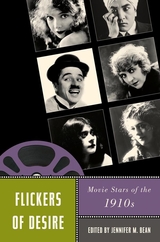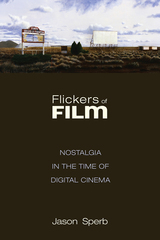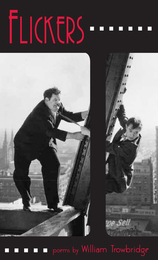3 books about Flickers

Flickers of Desire
Movie Stars of the 1910s
Bean, Jennifer M
Rutgers University Press, 2011
Today, we are so accustomed to consuming the amplified lives of film stars that the origins of the phenomenon may seem inevitable in retrospect. But the conjunction of the terms "movie" and "star" was inconceivable prior to the 1910s. Flickers of Desire explores the emergence of this mass cultural phenomenon, asking how and why a cinema that did not even run screen credits developed so quickly into a venue in which performers became the American film industry's most lucrative mode of product individuation. Contributors chart the rise of American cinema's first galaxy of stars through a variety of archival sources--newspaper columns, popular journals, fan magazines, cartoons, dolls, postcards, scrapbooks, personal letters, limericks, and dances. The iconic status of Charlie Chaplin's little tramp, Mary Pickford's golden curls, Pearl White's daring stunts, or Sessue Hayakawa's expressionless mask reflect the wild diversity of a public's desired ideals, while Theda Bara's seductive turn as the embodiment of feminine evil, George Beban's performance as a sympathetic Italian immigrant, or G. M. Anderson's creation of the heroic cowboy/outlaw character transformed the fantasies that shaped American filmmaking and its vital role in society.
[more]

Flickers of Film
Nostalgia in the Time of Digital Cinema
Sperb, Jason
Rutgers University Press, 2015
Whether paying tribute to silent films in Hugo and The Artist or celebrating arcade games in Tron: Legacy and Wreck-It-Ralph, Hollywood suddenly seems to be experiencing a wave of intense nostalgia for outmoded technologies. To what extent is that a sincere lament for modes of artistic production that have nearly vanished in an all-digital era? And to what extent is it simply a cynical marketing ploy, built on the notion that nostalgia has always been one of Hollywood’s top-selling products?
In Flickers of Film, Jason Sperb offers nuanced and unexpected answers to these questions, examining the benefits of certain types of film nostalgia, while also critiquing how Hollywood’s nostalgic representations of old technologies obscure important aspects of their histories. He interprets this affection for the prehistory and infancy of digital technologies in relation to an industry-wide anxiety about how the digital has grown to dominate Hollywood, pushing it into an uncertain creative and economic future. Yet he also suggests that Hollywood’s nostalgia for old technologies ignores the professionals who once employed them, as well as the labor opportunities that have been lost through the computerization and outsourcing of film industry jobs.
Though it deals with nostalgia, Flickers of Film is strikingly cutting-edge, one of the first studies to critically examine Pixar’s role in the film industry, cinematic representations of videogames, and the economic effects of participatory culture. As he takes in everything from Terminator: Salvation to The Lego Movie, Sperb helps us see what’s distinct about this recent wave of self-aware nostalgic films—how Hollywood nostalgia today isn’t what it used to be.
In Flickers of Film, Jason Sperb offers nuanced and unexpected answers to these questions, examining the benefits of certain types of film nostalgia, while also critiquing how Hollywood’s nostalgic representations of old technologies obscure important aspects of their histories. He interprets this affection for the prehistory and infancy of digital technologies in relation to an industry-wide anxiety about how the digital has grown to dominate Hollywood, pushing it into an uncertain creative and economic future. Yet he also suggests that Hollywood’s nostalgia for old technologies ignores the professionals who once employed them, as well as the labor opportunities that have been lost through the computerization and outsourcing of film industry jobs.
Though it deals with nostalgia, Flickers of Film is strikingly cutting-edge, one of the first studies to critically examine Pixar’s role in the film industry, cinematic representations of videogames, and the economic effects of participatory culture. As he takes in everything from Terminator: Salvation to The Lego Movie, Sperb helps us see what’s distinct about this recent wave of self-aware nostalgic films—how Hollywood nostalgia today isn’t what it used to be.
[more]

Flickers
Poems
William Trowbridge
University of Arkansas Press, 2000
In his latest collection of poems, William Trowbridge explores the fascination Americans have with movies, how “flicks” allow us to temporarily forget our problems and, ironically, to forget that real conflicts are what make us human. The language he uses is the American language of pop culture: sports talk, movie talk, shoptalk, and clichés—all are blended together into carefully crafted lines that are uniquely Trowbridge’s. Readers will be delighted to follow each poem to its effectively understated end.
These poems are dark comedies that capture both the eerie and the ordinary. This balance is not easily achieved, but like a veteran comedian executing a pratfall, Trowbridge makes it all seem natural. His surreal family, the Glads, satirizes life in suburbia and reflects the often absurd margins of our urban lifestyle. By contrast, a group of poems revolving around a packing house in Kansas City (Trowbridge worked there as a young man), reminds us of those darker places in our lives that exist just “across the street from the ledgers and lapels.”
The variety of subjects Trowbridge works with is refreshing. Whether he is writing about Buster Keaton, Fred Astaire, June bugs, baseball, the holocaust, Cadillacs, or old dogs, his eye is always focused on the turn of phrase that will catch us off guard. His well-crafted lines are full of wit and humor. He approaches his subjects like Coyote approaches Fox—smiling, ready to expose his dear friend to the reality of his existence through sleight of hand. And, like Coyote, he teaches us to laugh at ourselves or perish under the weight of our everyday lives.
These poems are dark comedies that capture both the eerie and the ordinary. This balance is not easily achieved, but like a veteran comedian executing a pratfall, Trowbridge makes it all seem natural. His surreal family, the Glads, satirizes life in suburbia and reflects the often absurd margins of our urban lifestyle. By contrast, a group of poems revolving around a packing house in Kansas City (Trowbridge worked there as a young man), reminds us of those darker places in our lives that exist just “across the street from the ledgers and lapels.”
The variety of subjects Trowbridge works with is refreshing. Whether he is writing about Buster Keaton, Fred Astaire, June bugs, baseball, the holocaust, Cadillacs, or old dogs, his eye is always focused on the turn of phrase that will catch us off guard. His well-crafted lines are full of wit and humor. He approaches his subjects like Coyote approaches Fox—smiling, ready to expose his dear friend to the reality of his existence through sleight of hand. And, like Coyote, he teaches us to laugh at ourselves or perish under the weight of our everyday lives.
[more]
READERS
Browse our collection.
PUBLISHERS
See BiblioVault's publisher services.
STUDENT SERVICES
Files for college accessibility offices.
UChicago Accessibility Resources
home | accessibility | search | about | contact us
BiblioVault ® 2001 - 2024
The University of Chicago Press









